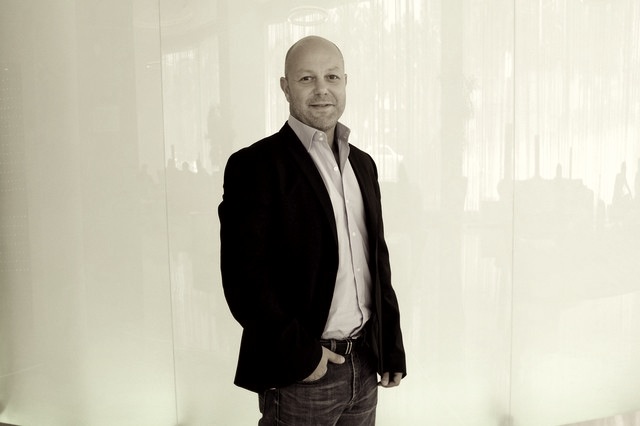Q&A: Digital Republic CEO Karim Khalifa Shares His Secrets to Success


Karim Khalifa is the founder and CEO of Digital Republic, one of the leading digital advertising agencies in Egypt and the region, with a number of award-winning campaigns in its impressive portfolio.
DR offers “360 Total Digital Solutions” to its range of big name clients, many of which are attracted by the agency’s creative, innovation-centered model.
While DR currently handles international brands, with offices in Cairo and Dubai, Khalifa built the agency from scratch, wearing multiple hats as the company grew. He is now an angel investor himself and an inspiring mentor for young entrepreneurs.
We sat down with the digital pioneer to pick his brain on the mobile scene in the Middle East, scaling startups, investing in Egypt and more:
You’ve seen plenty of highs and won awards, what have been the letdowns, what you may have done better as an agency?
The letdowns were the ones where we sometimes were forced by the clients to do something really boring and crap, such as sending a plain old SMS shot for example, where we are prone to limited engagement or activity or clicks – those are the kinds of things I’d say I hate the most.
We’ve done a couple of them and tried to convince the clients with otherwise, but sometimes you have to do what the client wants creatively, to a degree – as after all they too understand their own brand pretty well!

An example of persevering with a concept you believe in could be Axe: We fought to get that campaign approved. Once I got an email from the media director saying that he’d just seen the Effie award, ‘Well done, I know how much you guys fought to get that project in the first place’, so it’s worth always fighting.
Who is the owner of Digital Republic? It seems like you’re just the face of it all, but who is actually behind Digital Republic?
According to ownership structure, we are a group of individuals and there is an investment company that owns a large percentage of the company. So other than that, there are individuals, of which I am one.
Do you feel that without them, you wouldn’t have been the agency that you are today? That they gave you a big push in the industry? They took you from being a boutique agency to a big agency that hires approximately 100 people.
The main contribution would be a financial safety arm in terms of investment. Yet I think that a lot of the growth that occurred is because of the unique model in place at our agency, positioned early on in the Egyptian market, a model that was attractive to clients, so I think that’s one of the very specific reasons why we grew quickly.
It’s a model that delivered on certain creativity, innovation and a certain quality at the same time. When it comes to the creative revenue stream, the investors that came in I wouldn’t say were a major contribution to that, but to have a strong investor behind you opens a lot of doors and it did do that with the clients.
If that didn’t happen, would we still be here today? I would say we would still be here today, but perhaps in a slightly different shape or form. It wasn’t our make or break.
How have you maintained your signature touch?
Creative integrity is our priority, particularly with a focus on innovation in technology, that’s one of the reasons that we’ve maintained a certain level of quality and strong client base.
How has the market changed since you started and how did you maintain as much ground as you could when it comes to mobile?
We started as a mobile ad agency in the very beginning. We started way too early in the market for mobile back then. It evolved into online, which is what the market was ready for and now it’s coming back into full circle to mobile, which is great news.
I think mobile requires a very specific mindset and that’s the trick with mobile. You can’t just throw mobile as a sort of add-on at the end of the whole process, with whatever budget you have left. Mobile needs to be part of the creative process from the start so that it becomes integral with the campaign. And that’s the problem with agencies today, it’s often an afterthought rather than part of the main integration plan
I push the agency to use mobile whenever we can.
Example?

The McDonald’s Happy Apple activation. There were activations in the store, ads on TV and outdoors, a mobile augmented reality app in the store, so we integrated mobile from the start.
A problem we face is that mobile is very complex and it’s taken a long time for ad spend to match user uptake – and we’re not fully there yet as an ecosystem in the region.
One of the reasons is it’s a very complex ecosystem. We’ve got several players: technology providers, publishers, mobile operators, mobile ad networks, creative agencies, media agencies, users (and his/her privacy issues) and, of course, clients!
So all these players to work harmoniously together, to deliver something effective on mobile makes it very complicated.
What is your advice in general to newcomers to the field or to smaller/boutique agencies coming up?
Two things: 1.) Always operate with the highest of integrity and don’t look for the quick way up, always look long term.
2.) Whatever your differentiator is, remain loyal to its integrity. Remain loyal to the core of your own asset.
I would say that if you operate with integrity and you are loyal to your differentiator, you are off to a very good start.
What do you see as challenges in the market?
The complete chaotic state and unpredictability of the Egyptian market, it’s a challenge. You cannot predict your financials or other “normal” trends or anything like that, which makes our lives obviously very difficult to plan!
Is that one of the reasons why you branched out to Dubai?
Definitely one of the reasons was diversification, to work around the unpredictable nature of the Egyptian market, but not the predominant reason.
The predominant reason was to support regional brands that requested our presence in Dubai. We were working with regional brands that said we need to have you in front of us in Dubai, so it was to meet the need of the clients, but also to work around the unpredictability of the Egyptian market. The unpredictability still makes it challenging, it’s nice.
Whether it completely de-risks the unpredictability of Egypt, not really, Dubai is still a tough market.
What do you feel Dubai lacks and someone should go and attack?
I think mobile, but not just Dubai. I think the whole region. There’s a big opportunity in mobile and you can sense if a country is mobile ready or mobile active from their billboards telling you that their brands have an app or shortcodes or Instagram, etc… Dubai, Emirates is growing in that area – but there’s a lot more to be had.
How do you balance the whole family life and Cairo and Dubai and all of this?
I smoke a lot of shisha! Humour aside, I try to disconnect, which doesn’t work very often during the weekend and I try to do as much sports as I can.
Without the sports and the shisha it would be hard to remain calm all the time and give the physical time that I should give to my family, and the thinking time I need to give for my work.
Did it take you a lot of time to figure out that model? Were you always that person that worked day and night? And how long did it take you to create that separation model? What was the breaking factor?
I believe in the 80:20 percent rule: At the start of anything new, you work 80% to get only 20% out, which later evolves to working 20% to achieve 80% of what you want. Usually, when you get to the latter it’s time to think of doing something new!
So I think as we grew as a company, where I was effectively every function in the company at some point – from Account Executive to HR to Secretary to Creative to Planner to CEO – over time, I was able to be more of a CEO and doing what a CEO is supposed to be doing.
Having said that though, I still today do often have to get into the nitty-gritty of things.
So the efforts you put up front and the suffering and pain starts to reciprocate and you start getting out more. It naturally happens, due to the growth curve.
Are you a social guy? Are you a guy who goes to social gatherings and events or are you a guy that goes to things he has to go to?
I’ve fine-tuned my social activity based on two things: I no longer bother going to stuff that I don’t have fun in; I meet up with people I like. And I do what I call business-social.
But in terms of social stuff, I only go to things I’d enjoy.
What’s next? What’s your plan? Do you intend to expand more regionally? Expand more in Egypt?
The plan is to expand and grow our regional capability, to maintain our lead stance in creative innovation and technology, to always deliver total 360 digital solutions, and take the focus more on mobile, content and the latest technologies out there.
For me, at some point in the future, once we’ve created our regional capability further, I think I might want to study and practice planetary science – whether as a job or as a hobby, I’m not sure yet.
That’s my dream, that the agency manages to create a regional capability, and then I can – on the side – focus on planetary science.

Is this a new dream?
I think it’s been developed. I’ve always been big on physics and cosmology and astronomy since I was a child, then it grew into a fascination of the universe and the stars. And later on, I grew curious about potential life that’s outside earth, which then developed into fascination about alien environments on planets and moons in our solar system and the exoplanets beyond.
It is fascinating to me when you see the different types of environments and geological conditions in these places.
Is this a passion you share with your son?
Karim Khalifa with himself. My son is still 4; he’s too young for that!
Would you recommend young entrepreneurs to take on investors? As you know, Egypt is now full of young entrepreneurs who lack proper funding.
I would encourage it if you are a very small startup with a fantastic idea, because yes, if you’re small, you do need the money. But my advice is: Do not look for the money only. Money is very easy to get if your idea and concept are strong, there are a lot of people willing to give money. Look for what else the investor can provide in addition to money, like clients or expertise
If you can achieve your business plan without an investor then you should do it, because an investor means a decrease in the ownership and giving ownership to others.
Of course, if you are a startup at a very early stage and only need the money to start, then it’s fine. When you’re not at such an early stage, it’s the money “plus plus” – other value-adds that you should seek.
Try to find a person with a useful background or expertise, someone who will help you grow. So for example, an investor who has money but can bring clients to your table, an investor who would let you use their resources, and so on…
You’ll find a lot of people who will say they will give you an X amount of money, but look for the investor who will give you money and help you grow as well, not just gives you the money, disappears, comes back a couple of years later and asks for their return on investment.
What are your thoughts on angel investment? I know you were interested at some point.
As one of my good friends and an investment banker told me, for me, and especially when you’re not a multi-billionaire, you have to look at it in a sort of “sniper” approach rather than a “machine gun” type approach, i.e. invest with focus, which means you potentially have to miss out on a lot of different small startups to invest only in what you are TOTALLY convinced are the right ones.
Have you invested?
I have invested in other startups that are not in the same entrepreneurial ecosystem that we’re in.
Investing and being lucky enough with the “sniper shot” approach and hitting that one startup that ends up being the next big thing is very risky (and unlikely), especially when you don’t have a big capacity as an investor to invest in several at the same time.
I’ve invested in a couple, and I think it’s a huge new beginning, the entrepreneurship environment in Egypt, and I think there is going to be massive growth in this area in the next three to five years.
Revolution and all, we know the effect of that. But in a country like Egypt, hardships and struggles bring about innovation.
What do you feel about Egypt as a country and the direction it’s taking? Do you see positivity? Do you see growth? Or do you see negativity attributed to what’s happening?
I would say I am a revolutionary at heart, but a realist and pragmatist in mind. I believe in the battles of revolution at heart, I believe in the struggle of the poor, but also I’m a realist. It’s all about timing and choosing your battles, and now its time to work hard and get on with some country-building…
In terms of the future, of course I see ups and down. But overall, I see a ‘two steps forwards, one step back’ scenario. And that’s normal for any revolution. It’s good, so don’t get negative when you see the country take that one step back and always remember that there are two steps forward coming.
So you’d encourage people to continue investing in Egypt?
Absolutely. I think that even when things are unpredictable, I still genuinely believe that, long term, moving two steps forward while occasionally experiencing one step backward, we will ultimately be in good shape as a nation.
WE SAID THIS: Check out our interview with Microsoft Vice President Aly Faramawy.
